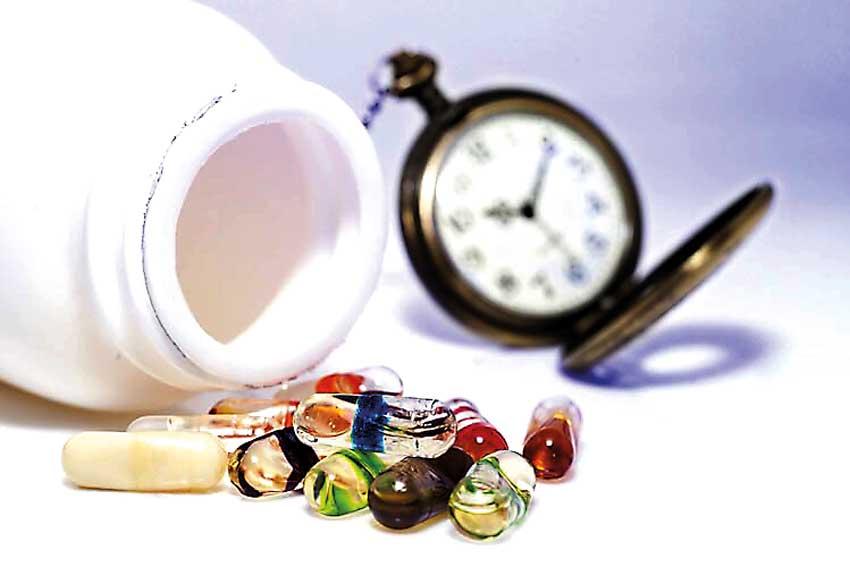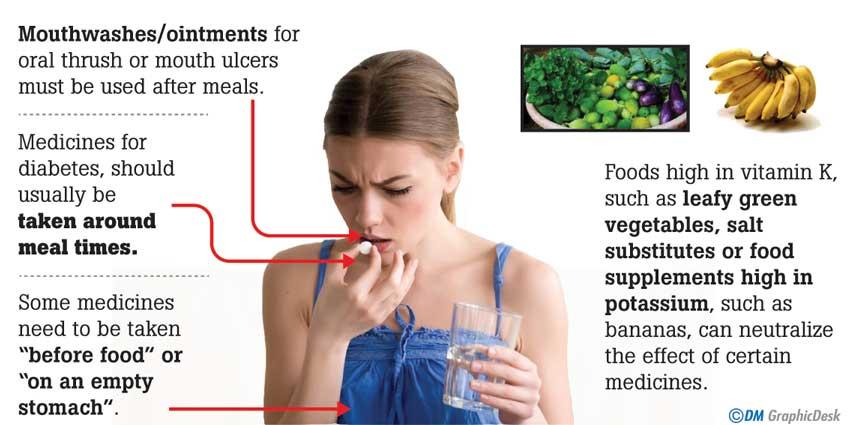15 Jan 2021 - {{hitsCtrl.values.hits}}

 Before meals, after meals and at bed time are some of the commonest directives found on drug prescriptions. Every one of us has visited the hospital at some point in our lives and have followed these instructions while taking medicines. The science behind these instructions seldom bothers us, unless upon missing a dose, or skipping a meal.
Before meals, after meals and at bed time are some of the commonest directives found on drug prescriptions. Every one of us has visited the hospital at some point in our lives and have followed these instructions while taking medicines. The science behind these instructions seldom bothers us, unless upon missing a dose, or skipping a meal.
It is then, when one wonders and ponders over what is to be done next. “Should I just skip this dose?” Well, It does say before meals, but I’ve started eating already, not a tremendous lot though, so maybe I can take it now? A similar script of thought cascades in the minds of those who skip meals. “The label says after meals, but I don’t have an appetite, should I just take it anyway? The medicine will somehow work, won’t it?”
The first thing to remember when you find yourself in a medical quandary like this, is the golden rule: instructions are there for a reason.
Some medicines need to be taken with or after meals. This is to reduce side effects such as nausea or vomiting. Although not all patients experience this, nausea and vomiting are the most common side effects in pharmacology, and when taken in after food, this effect is greatly reduced.
Upon reading the word ‘side effects’, many panic. However, it is to be kept in mind that your physician has already considered this, and has prescribed a given medicine only because its benefits outweigh the inconveniences caused by minor side effects.

Some strong medications cause irritation of the stomach lining, causing inflammation and potentially ulcers. This may cause indigestion as well. The food serves as a buffer between the lining of the stomach and the drug, and will aid in the drug being absorbed without causing damage to the stomach.
Non-steroidal anti-inflammatory drugs (NSAIDs), such as diclofenac and ibuprofen, that are often used for pain management and in the treatment of arthritis, Aspirin, steroid medication such as prednisolone and dexamethasone are some of the medicines that need to be watched out for in terms or gastric irritation.
Some medications require food in the stomach and gut for the body to absorb them properly, as they cannot be absorbed on their own.
Medicines for diabetes, should usually be taken around meal times, as instructed. When the timings are not followed, diabetic patients experience a sugar spike immediately after eating, and then would get into a hypoglycemic (low sugar) state. Following the timing instructions helps maintain a steady blood sugar level.
Mouthwashes/ointments for oral thrush or mouth ulcers must be used after meals. This is because eating washes the medicine away too quickly.
Some medicines need to be taken “before food” or “on an empty stomach”. This is because food/drinks or digestive enzymes can affect the absorption of these drugs. Sometimes, food or enzymes react with a given drug to either increase the amount of that drug in the bloodstream to dangerous levels, or could react with the drug to decrease its efficacy. Some food items such as grapefruit juice, cranberry juice, foods high in vitamin K, such as leafy green vegetables, salt substitutes or food supplements high in potassium, such as bananas, can neutralise the effect of certain medicines.
As a general rule, medicines that are supposed to be taken on an “empty stomach”, should be taken about an hour before a meal, or 2 hours after a meal.
Forgetting these instructions on rare occasions may not cause any harm, but taking these medicines with food regularly would cause the medicines not to work as they should.
If you are unsure how or when to take your medication, clarify this with your physician prior to leaving the consultation. Pharmacists would be able to advise as well, when you provide an acceptable prescription.
21 Dec 2024 13 minute ago
21 Dec 2024 2 hours ago
21 Dec 2024 4 hours ago
21 Dec 2024 4 hours ago
21 Dec 2024 6 hours ago